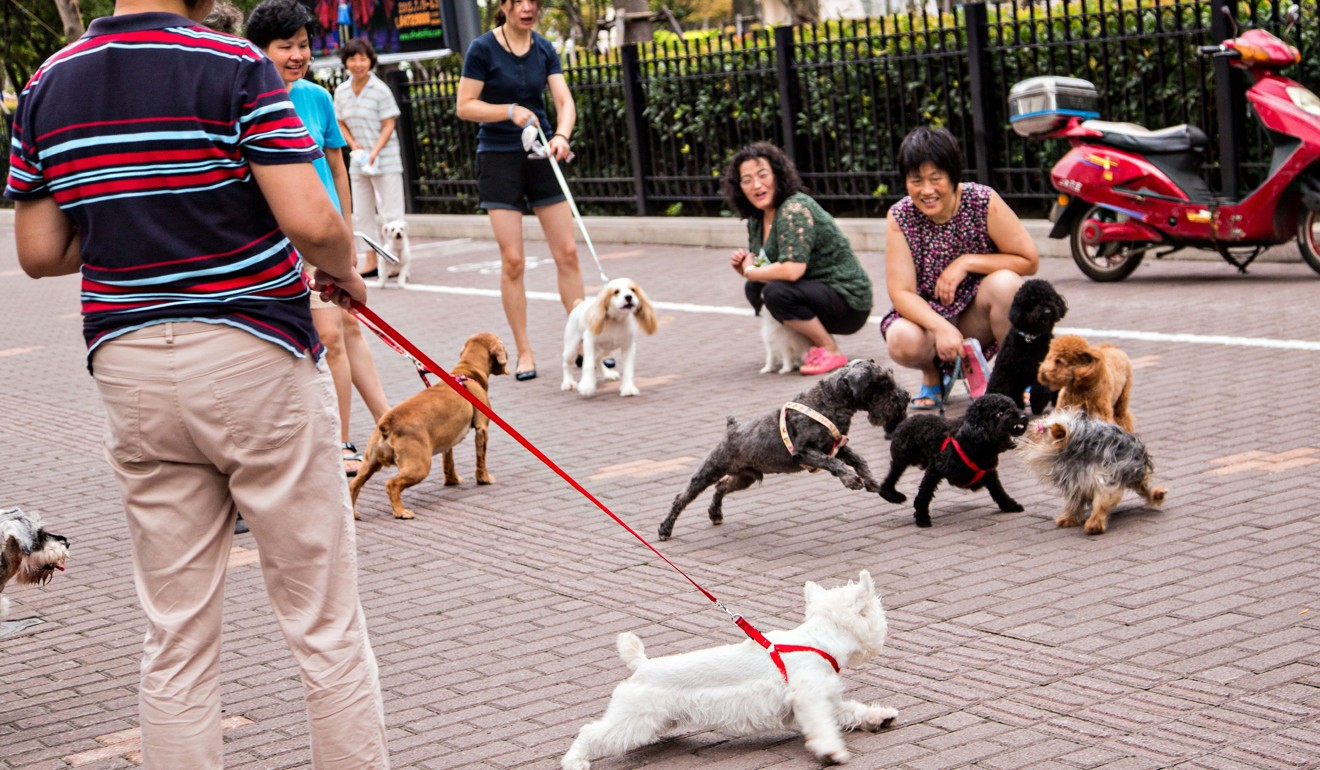
It’s war on man’s best friend: a spate of dog poisonings hit China as frustration with owners turns murderous
A series of attacks in recent weeks have left dog owners increasingly worried that strangers will take out their frustrations on their pets
Sarah Liu watched helplessly as her beloved black poodle Xiaoerhei breathed its last in a veterinary surgery – the victim of a ruthless killer.
The morning of August 3 had started normally enough with Liu walking the 20-month-old poodle on a leash through a Beijing park.
Suddenly the dog spied a hunk of sausage and devoured it – too quickly for the woman to stop it.
When they got home, Xiaoerhei started vomiting. Then it twitched uncontrollably and fell headlong to the ground.
Liu rushed Xiaoerhei to the veterinarian's office. It only took the vet one look to know that the animal was beyond help. It had been poisoned.
Police in eastern China use QR codes on dog collars to bring pet owners to heel
The sausage the dog had swallowed had been stuffed with a deadly drug. Someone had deliberately left it on the side of the road, hoping a dog would find it.
Within the next few days, the death toll from a rash of similar poisonings in the area would be seven dogs and one cat, Liu told the South China Morning Post.
Police told the owners who jointly reported the incidents that they needed to analyse whether the drug was poisonous to humans before they could take the case further.
The spate of poisonings is one of a string of attacks targeting dogs in recent weeks that have left pet owners expressing their fears that there has been an upsurge in violence against pets.

Pet ownership has been on the rise in China in the decades after the Mao era, when it was denounced as a bourgeois habit.
But the shift in attitudes that means an increasingly affluent and urbanised society has started to see animals as friends and companions still creates regular friction with older views of dogs.
Stories of animal cruelty still abound as do reports of pets being stolen for meat – much to the horror of China’s growing legion of animal lovers.
The problem is compounded by the fact there is no specific law on the statutes against animal cruelty even though legislation was first proposed in 2009.
There have also been regular complaints that ill-trained animals are being allowed to run off the leash and foul public spaces – and these have in turn led to sporadic reports of vigilantes harming animals in response to their frustrations.
Chinese police investigate threats against family over dog killing
Animal lovers across the country have complained about an upsurge in attacks on dogs in recent weeks following the scandal surrounding Changchun Changsheng Biotechnology, which was found to be making ineffective rabies vaccines.
Internet users started sharing stories about people dying from dog bites even though they had received a shot of vaccine, and this only fuelled their animosity towards the animals.
A recent spate of attacks suggests that animosity as moved into a new, violent phase.
In the following weeks, China saw large-scale action against dogs, not just with poisoning, but sometimes with straight killing of strays.
Last week a number of photographs circulated on the internet showing a number of dogs being beaten to deaths in different cities across Shaanxi province.
Another social media user claimed that in the southwestern megacity of Chongqing all the dogs in one residential compound had been poisoned or killed.

A popular social media posting that appeared to advocate the killing of dogs using the drug isoniazid, which is normally used to treat TB in humans, was forwarded more than 4,000 times and attracted over 5,000 comments from WeChat users demanding“justice” or saying they would try the method.
Although the article swiftly disappeared from WeChat it achieved the author’s purpose, arousing discussion on Weibo and other internet forums – with many blaming it for fuelling the attacks on dogs.
The writer of the piece, who called himself Zizhu Mr Zhang insisted: “I like dogs, but I also hate those owners that let their dogs run around in crowded places, such as residential compounds, squares or parks.
“The owners may not be afraid of being bitten by their dogs, but it's a huge threat to everybody else.”
When contacted by the South China Morning Post he insisted he was merely compiling recent news reports and chats on the topic of dog killing.
The activists taking on Asia’s cruel, and booming, trade in dog meat
But in his replies as well as his Weibo posts, he made no effort to conceal his disdain for uncivilised owners, referring to them as “dog bullies”.
“I even researched some news of those dog bullies threatening law enforcement organs and related organisations and conning people out of money,” he said. “I [thought I] might compile the reports and write an article.”
One supportive reader of the piece posted: “Human rights should be bigger than dog rights. Whatever the law can’t manage, isoniazid will!”
In the face of this sentiment pet owners have spoken of a growing fear that vigilantes will try to hurt their dogs.
“I think most dog owners, especially the young generation, are quite civilised already,” Lisa Li, a 30-year-old fashion website editor living in Beijing, said.
She recently bought a German shepherd but will only walk it late at night to minimise the danger that it will do anything to provoke the ire of passers-by.
“Dogs don't understand anything, it’s the masters’ fault if they behave undesirably,” she said. “Dogs shouldn't have to face this inhumane punishment by vigilantes.”

The calls for violent action against dogs prompted warnings that the killers could fall foul of the law.
Zhou Kai, a lawyer at the Nanjing-based Jiangse Tianzhe Law Firm, said killing pets would breach property laws and the killers should be forced to compensate the owners for their loss.
Furthermore, even though isoniazid can't kill a person, it can still be harmful to one's health, which means that scattering large quantities of the drug could be considered a criminal offence.
Jiang Hong, director of the Xian-based Red Pomegranate Stray Animal Rescue Centre, said it is wrong to encourage people to fight misdemeanours with violence.
“The focus of dog keeping should be to regulate the owners, rather than the dogs,” he said.
“Many countries already have mature systems we can learn from. We call for laws and regulations regarding animal protection.”
China housing estates’ war on unleashed dogs unlikely to resolve rising tensions
Some Chinese cities have also found effective ways to control dogs – and by extension their owners.
In Jinan in the eastern province of Shandong province, a new system in use since last year allows licence information to be accessed by using an app to read a QR code on the dog’s collar, making it easier to penalise owners if their pet misbehaves.
Since introducing the regulation, complaints from the public about dogs being off leashes dropped 43 per cent compared with the previous year, and complaints about dogs biting people and barking plunged 65 per cent in the same period.
For Liu and other Beijing residents, however, their biggest hope is that police get to the bottom of this deadly campaign and end the violence against dogs.
“Nobody cares about these incidents,” Liu said.
“China is too big, they haven't even figured out people-related issues yet. Who cares about animals?” she asked. “Dogs aren't even a protected species.”

.jpg?itok=H5_PTCSf&v=1700020945)